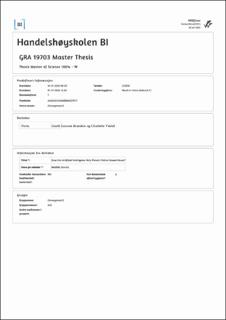| dc.description.abstract | Due to the increasing problem of Online Child Sexual Exploitation and Abuse
(OCSEA) over the past years, finding a way to prevent it has become more
important. There has never been easier for perpetrators to contact children and
hide their identity. The problem has increased to such an extent that governments
around the world consider new laws that would have to breach privacy in order to
prevent the spread of inappropriate materials through digital platforms. The firms
and marketing will have to play a critical role in making this change. But the
change is flooded with serious tensions and challenges on all sides: for firms,
governments, and law enforcement. Marketing has a pivotal role to help explain
and remedy some of those challenges. This thesis aims to investigate how people
would react to being surveilled on social media platforms with the intention of
preventing OCSEA. If consumer’s privacy is to be severely breached, who should
do the message screening: an artificially intelligent robot, or a human? The
increasing health problem has contributed to the European Commission proposing
a derogation that allows tech companies like SoMe platforms to derogate from the
EU privacy framework in order to detect, report, and remove abuse material and
prevent OCSEA. The United Nations Convention on the Rights of Children says
that children under 18 years have the right to protection and the right to be heard
(FN-sambandet, 2022), therefore, preventing crimes against children is important.
Not only can it be harmful to the child physically, but also mentally. Several
physical ailments are a consequence of such abuse. Fortunately, there are
technologies like artificial intelligence (AI) that can help detect, report, and
prevent this type of abuse. Even though we live in a technologically developing
world, there is still a lot of scepticism towards AI. In general, research evidence
indicates that humans are always preferred over AI in decision making that may
deal with some type of a moral issue.
We also investigate ways in which new regulations in preventing online abuse
could be achieved. We want to understand if people will be more accepting of an
AI robot rather than a human surveilling their online activity and messages, and in
which scenarios they allow it. Their preferred choice is measured by their trust in
AI, fear of being misinterpreted by AI, and fear of being discriminated against. In
addition, we investigated different factors like people’s anxiety levels and privacy
Page iii
concerns when measuring the research question. To check if other variables
affected people’s choice of conductor, we looked at several moderators such as
“Age” and “Gender”. In addition, we checked for “The purpose of surveillance”
to see what purposes would be accepted. An extensive survey was conducted to
map people’s preferred choices. In conclusion, our study found that most people
prefer an AI robot over humans to surveil their online activity and messages. It
also shows that people are more accepting of surveillance if it is for the betterment
of society, rather than for commercial and advertising purposes. | en_US |
